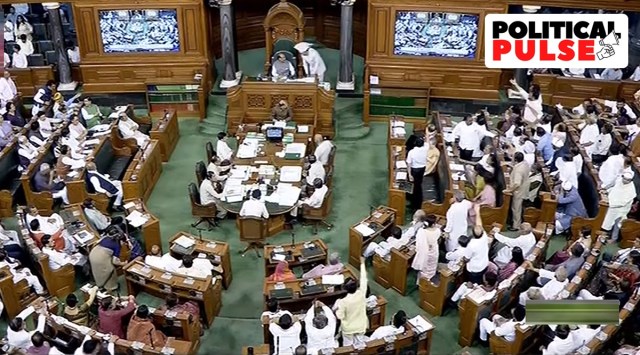© The Indian Express Pvt Ltd
Latest Comment
Post Comment
Read Comments
 New Delhi: MPs during a debate on no-confidence motion in Lok Sabha, during the Monsoon session of Parliament, in New Delhi, Tuesday, Aug. 8, 2023. (PTI Photo)
New Delhi: MPs during a debate on no-confidence motion in Lok Sabha, during the Monsoon session of Parliament, in New Delhi, Tuesday, Aug. 8, 2023. (PTI Photo) Against the backdrop of the Manipur conflict, the Lok Sabha on Tuesday began the debate on the no-confidence motion introduced by Congress MP Gaurav Gogoi. Scheduled to continue till Thursday, the debate will last 16 hours and feature 16 speakers. It’s the 28th no-confidence motion introduced in the Lok Sabha since 1952, of which only one has resulted in a government’s dismissal — the Janata Party government led by Morarji Desai, in 1979.
Here’s some numbers from previous no-trust motions:
Third, fourth Lok Sabhas saw most no-trust motions
Of the 17 Lok Sabhas since Independence, all but seven have faced at least one no-confidence motion. Unsurprisingly, Congress governments have faced the most no-confidence motions at 23, followed by 2 for the BJP and 2 for the Janata Party.
J B Kripalani, a one-time Congress member and later critic, moved the first no-confidence motion, in 1963, against the Jawaharlal Nehru-led government following India’s comprehensive defeat in the 1962 war against China. The motion, however, was defeated by a margin of 285 votes — the highest recorded till date.
Indira Gandhi-led governments faced 15 no-confidence motions, followed by three each for Lal Bahadur Shastri and P V Narasimha Rao, and two for Morarji Desai. No ruling government has lost a no-confidence motion by votes.
In 1979, Morarji Desai resigned before voting could be held, after Congress MP Y B Chavan introduced the motion against his government over the incumbent party’s declining strength in the House. It marked the end of the first non-Congress government in India. Desai had previously survived a no-confidence motion in 1978.
While Indira Gandhi avoided defeat in each of the 15 no-trust motions her governments faced between 1963 and 1974, the margin was the narrowest in March 1967, with 95 votes making up the difference. Incidentally, the motion was introduced by then-Jana Sangh MP Atal Bihari Vajpayee, who remains the only person to have both introduced and faced a no-trust vote.
Between 1992 and 1993, the Narasimha Rao-led Congress government faced three no-confidence motions. Though he won all, his government saw the two lowest margins of victory — 46 votes in 1992 and 14 votes in 1993. Rao’s minority government, rocked by the balance-of-payments crisis, the Babri Masjid demolition and allegations of corruption, faced a no-trust motion introduced by CPI MP Ajoy Mukhopadhyay in July 1993. He survived the scare and went on to complete his term, but not before facing allegations of paying off the Jharkhand Morcha Manch’s 5 MPs to vote in his government’s favour.
The CPI(M)’s Jyotirmoy Basu remains the MP to have introduced the most no-confidence motions — four, all against Indira Gandhi governments, between 1973 and 1975. Vajpayee and Janata Party MP Madhu Limaye moved two no-trust motions each.
Number of no-confidence motions by Lok Sabha

Number of no-confidence motions by prime minister

Four no-trust debates lasted more than 20 hours
The 1964 no-trust debate over corruption allegations against the Shastri-led government spanned a record six days. Four days was the next longest span of debates, faced by Shastri, Nehru and Indira Gandhi. Only on three instances did the debates end in one day — for Indira Gandhi in 1975 and 1982, and Narendra Modi in 2018.
Shastri’s 1964 no-trust motion also saw the longest debate, lasting more than 24 hours. Nehru, Rao and Vajpayee each faced debates longer than 21 hours. The no-confidence debates against Indira Gandhi in 1968 and 1975 had the shortest durations at just over six hours each.
Longest duration of debates



